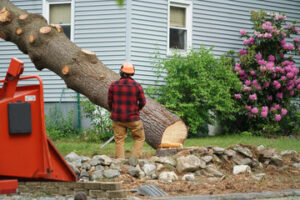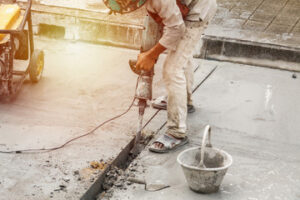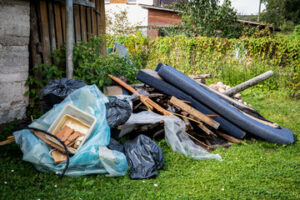Trees are a vital part of any landscape, adding beauty and providing shade. But, they require proper care to thrive and avoid becoming a safety hazard.

This is where professional tree service comes in. It offers several advantages, including: professional expertise, specialized equipment, and insurance coverage. Read on to learn more about why hiring Affordable Tree Service Richmond VA is worth the investment.
Professional tree service providers handle all aspects of maintenance, allowing property owners to save time and effort while ensuring the safety and health of their landscape. From pruning to mulching, and even tree removal, experienced arborists use best practices for a healthy, vibrant yard. They offer convenient scheduling, and adhere to industry standards and safety protocols. This ensures that the work is executed correctly, minimizing potential damage and injury risks.
In addition to performing critical tree care tasks, expert arborists also keep up with the latest trends and technologies in landscaping. As a result, their services provide a more aesthetic appearance that boosts property value and appeal. This is particularly true for commercial properties, where the right trees can make a significant difference in the overall feel of the space.
Attempting DIY tree maintenance can be hazardous, and a lack of knowledge may result in irreversible damage to the landscape. A professional tree service company will have access to specialized equipment designed specifically for tree trimming, pruning, and removal. This equipment can minimize the risk of injuries, and allow for the safe handling of large, unstable trees. Homeowners who attempt these tasks without the proper equipment often end up with unsightly, damaged, or even dead plants.
Trees are essential to a healthy ecosystem, reducing pollution, enhancing property values, and providing shade and wildlife habitat. Nevertheless, these natural wonders require proper care to thrive and provide their intended benefits. Professional tree service companies are trained to identify issues such as disease, pest infestations, and structural defects and take proactive measures to correct them.
Trimming isn’t just about cutting back overgrowth; it involves a delicate balance of removing and retaining branches to promote tree health and enhance beauty. Experienced arborists employ a strategic approach to pruning that takes into account each tree’s unique needs and structure. This is in contrast to the indiscriminate pruning that some untrained individuals perform, which can lead to improper growth patterns and impair tree health.
In addition to pruning, professional tree services can also assist with mulching, fertilization, and other forms of landscaping that improve plant health and resilience against diseases and pests. They can also help protect homes and businesses by removing dangerous branches that interfere with power lines or pose a threat to the safety of property owners and passersby.
Safety
When working with tree services, property owners can rest assured that safety measures are taken into account. This includes not only ensuring that equipment is properly maintained and functioning, but also analyzing the area around each job site to identify potential hazards. Taking these precautions prevents accidents from occurring that could compromise the health of a tree and the safety of others on or near the site.
When hiring a tree service, property owners should be sure that the arborists on staff are certified and trained in various aspects of tree care. This includes knowledge of the unique characteristics and needs of each type of tree, which helps to ensure that it is trimmed or removed in the safest manner possible. Licensed arborists should also be familiar with local regulations regarding tree cutting, and they should proactively secure the proper permits needed to complete work on each project.
Tree trimming is a high-risk activity that requires strict adherence to safety protocols. The combination of working at heights and using sharp tools creates a situation that is potentially dangerous for those not familiar with the industry. In addition, working near power lines presents additional risks. It is important that all workers, including arborists, wear personal protective equipment such as hard hats, goggles, hearing protection, fluorescent vests and cut-resistant trousers.
Safety measures also include establishing effective communication between employees while working on site. This can be accomplished by using hand signals or headsets and walkie-talkies to avoid yelling over loud equipment. This is especially important when working with large or dangerous trees.
The final safety measure is determining the felling zone, or the area where a tree will fall after it has been cut. This zone is important to protect those in the vicinity of the tree, as well as any cars parked on the street or pedestrians. A good way to estimate where a tree will land is by holding an ax handle at arm’s length and imagining it falling.
As you can see, the benefits of using professional tree services are numerous. They can help to save time and money, as well as provide peace of mind that your home and property are protected from potentially hazardous falling limbs.
Expertise
Unlike a do-it-yourself approach, a professional tree service is staffed with certified arborists who undergo rigorous education and training. This allows them to have a comprehensive understanding of the intricacies of different tree species, including their growth patterns and specific needs for healthy functioning. They can identify and address potential risks before they escalate, preventing accidents and property damage.
Furthermore, their licensure proves that they adhere to industry standards and safety protocols during their work, protecting homeowners against liability risks. Insurance coverage also mitigates the financial costs of unforeseeable incidents, giving clients peace of mind and a sense of security.
A reliable professional tree service company has the equipment and expertise to handle a variety of tasks, from pruning and trimming to stump grinding and full removal. They use specialized machinery and tools designed specifically for handling the rigors of arboriculture, enabling them to complete their work quickly and efficiently. By contrast, trying to tackle these tasks on your own can be dangerous and potentially result in irreparable damage to your property and trees.
In addition to their knowledge of proper arboriculture, these professionals have years of experience dealing with a range of situations that call for expert intervention. For instance, severe weather conditions like storms and high winds can inflict substantial damage on trees. This leaves weakened branches and trunks susceptible to falling and posing serious risks. A professional tree service can safely clear damaged trees and assess their structural integrity, preventing future damage and accidents.
Moreover, regular inspections conducted by professional arborists allow them to identify and treat early signs of disease or insect infestation. As such, they can prevent problems from escalating to major threats that could impact the health of your landscape and the well-being of inhabitants and passersby.
Peace of Mind
Trees are important to the overall beauty and value of a property, but they also present potential hazards if they are not properly cared for. With professional services, homeowners can rest assured knowing that their trees are in good hands and that they will be protected from any damage or injury that may occur as a result of a fallen or diseased branch. These professionals are skilled in all areas of tree care and maintenance, including pruning, stump grinding, lot clearing, and emergency service.
In addition, a reputable tree service will have an established reputation in the community. Homeowners who are looking for a reliable and trustworthy provider should ask friends and neighbors for recommendations. These recommendations are often based on firsthand experience, meaning that they will be more likely to lead to an accurate and honest assessment of a particular company.
When it comes to choosing a tree service, it’s also essential to make sure that the company is licensed. This is a sign that the company follows local regulations and is committed to doing things the right way. It also protects clients in the event of any unforeseen accidents or damages that may occur during work on their property.
While it is tempting to cut costs by hiring an unlicensed, inexperienced tree service, this could ultimately end up costing homeowners more in the long run. Homeowners who hire an unlicensed tree service may not be covered in the event of an accident or damage, leaving them with costly repair bills and a major headache.
A reputable tree service will have comprehensive insurance coverage that safeguards their clients from any unforeseen incidents or accidents that may arise during work on the property. These providers will have liability insurance as well as workers’ compensation insurance, which can protect homeowners from any financial repercussions in the event of an accident.
Regular tree trimming is an essential part of keeping trees healthy, reducing the risk of damage or injury during storms and providing homeowners with added privacy. The right tree service can also help homeowners avoid expensive repairs by identifying potential problems early, such as leaning trees or exposed roots, and taking preventative measures to ensure that the health of their trees is maintained.



